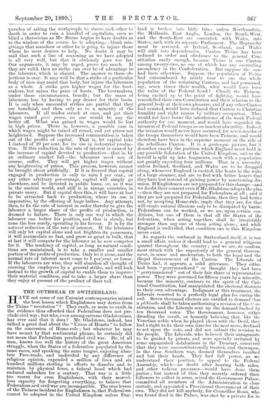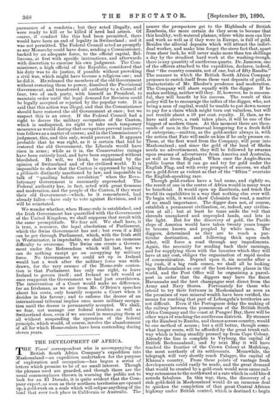THE OUTBREAK IN SWITZERLAND. fl AVE not some of our Unionist
contemporaries missed the best lesson which Englishmen may derive from the Ticino "revolution"? They exult, or seem to exult, in the evidence thus afforded that Federalism does not pre- clude civil war ; but who, even among extreme Gladstonians, has ever said that it does ? Mr. Gladstone, indeed, has talked a great deal about the "Union of Hearts" to follow on the concession of Home-rule ; but whatever he may have meant by that sentimental phrase, he certainly did not mean that Federalism precluded civil war. He, of all men, knows too well the history of the great American struggle, when the States of a federation populated by the same races, and speaking the same tongue, enjoying abso- lute Free-trade, and undivided by any difference of religious opinion, expended a million of lives and six hundred millions sterling in efforts to dissolve and to maintain by physical force, a federal bond which had endured unbroken for a century. That war is a little too recent for even Englishmen, with their marvel- lous capacity for forgetting everything, to believe that Federalism and civil war are incompatible. The true lesson of the Ticinese incident for Englishmen is, that Federalism cannot be adopted in the United Kingdom unless Eng- land is broken into little bits ; unless Northumbria, the Midlands, East Anglia, London, the South-West, and the South-East are converted, with Wales, into States, each with its separate Parliament. The Ileptarchy must be restored, or Ireland, Scotland, and Wales will sink into dependencies. Canton Ticino has been reduced to order and obedience to the general Con- stitution easily enough, because Ticino is one Canton among twenty-two, no one of which has any overruling ascendency in the Confederation. But suppose the case had been otherwise. Suppose the population of Ticino had outnumbered by nearly four to one the whole population of the remaining Cantons, and had possessed, say, seven times their wealth, what would have been the value of the Federal bond ? Clearly the Ticinese, being excited up to the point of fighting, would have remodelled their own Constitution and their relation to the general body at their own pleasure, and if any other Canton had resisted, would have reduced that Canton to Christian humility and right reason by military occupation. They would not have borne the interference of the weak Federal authority for one moment, and would have regarded the invasion of Federal troops as an insolent absurdity. Indeed, the invasion would never have occurred, for seven-tenths of the troops themselves would have been Ticinese, and would therefore have been in the supreme moment on the side of the rebellious Canton. It is a grotesque picture, but it describes exactly the position which England must hold in any possible federation of the United Kingdom, unless she herself is split up into fragments, each with a population not greatly exceeding four millions. That is a necessity, unless Ireland, Scotland, and Wales are to be dragged along, whenever England is excited, like boats in the wake of a large steamer, and are to feel with bitter hearts that they have lost instead of gaining power by sanctioning dis- union. If Englishmen are not prepared for this change—and we doubt their consent even if Mr. Gladstone adopts the plan —then they are not prepared for Federalism at all ; and if they are not prepared for Federalism, then they had better not, by accepting Home-rule, imply that they are, for that will create natural illusions only to be dissipated by battle. Federalism can be worked, as we see, upon certain con- ditions, but one of them is that all the States of the federation, when acting together, shall be irresistibly stronger than any one of them acting alone ; and while England is undivided, that condition can in this Kingdom never exist.
As regards the outbreak in Switzerland itself, it is but a, small affair, unless it should lead to a general religious quarrel throughout the country ; and we are, we confess, most struck with the superiority of the general Govern- ment, in sense and moderation, to both the legal and the illegal Governments of the Canton. The Liberals of Ticino had, it appears, a solid grievance. They either had been " gerrymandered " or thought they had been "gerrymandered" out of their fair share of representative power. They were governed for fifteen years by a minority, because the minority, contrary to the spirit of the Can- tonal Constitution, had manipulated the electoral districts to their own advantage. Indignant at this treatment, the Liberals resorted to a perfectly legal plan for curing the evil. Seven thousand electors are entitled to demand that a ple'biseite shall be taken authorising a revision of the Con- stitution, and the Liberals sent up the demand backed by ten thousand votes. The Government, however, either dreading the result, or honestly believing that, like the Venetian noble when he played chess with the Devil, they had a right to fix their own time for the next move, declined to act upon the vote, and did not submit the revision to the people. The Liberals, who believed their antagonists to be guided by priests, and were specially irritated by some unpunished defalcations in the Treasury, conceived that they were unconstitutionally treated, and thereupon, in the true Southern way, deemed themselves insulted and lost their heads. They had full power, as we understand their position, to appeal to the Federal Assembly, which—no doubt after hearing both sides, and other tedious processes—would have done them justice ; but instead of this, they secretly ordered their followers to collect in arms, seized the Government Palace, committed all members of the Administration to close custody, and appointed a Provisional Government of their own. They did not kill anybody, for Councillor Rossi, who was found dead in the Palace, was shot by a private foe in pursuance of a vendetta ; but they acted illegally, and were ready to kill or be killed if need had arisen. Of course, if conduct like this had been permitted, there would have been an end of legality in Switzerland ; and it was not permitted. The Federal Council acted as promptly as any Monarchy could have done, sending a Commissioner, backed by an adequate force, to the official capital, Bel- linzona, at first with specific instructions, and afterwards with discretion to exercise his own judgment. The Com- missioner, a high official of the Republic, considered that his duty was to do justice, if possible without provoking a civil war, which might have become a religious one ; and he did it. He released the members of the old Government without restoring them to power, dissolved the Provisional Government, and transferred all authority to a Council of four, two of each party, with himself as President, to maintain order until the legal demand for Revision could be legally accepted or rejected by the popular vote. It is said that this action was illegal, and that the Commissioner should have restored the old Government at once ; but we suspect this is an error. If the Federal Council had a right to decree the military occupation of the Canton, which is undisputed, its right to take such temporary measures as would during that occupation prevent insurrec- tion follows as a matter of course; and in the Commissioner's judgment, this, and this only, would prevent it. It appears probable that he was right, as it is certain that had he restored the old Government, the Liberals would have risen in arms ; while as it is, the Conservative risings have been entirely local, and have been suppressed without bloodshed. He will, we think, be sustained by the opinion of Switzerland and of the civilised world. It is impossible to show that the Canton is oppressed by taking a plebiscite distinctly sanctioned by law, and impossible to talk of "quailing before revolution" when the Revo- lutionary GoVernment is summarily superseded. The Federal authority has, in fact, acted with great firmness and moderation, and the people of the Canton, if they want their old Government—which, be it remembered, had already fallen—have only to vote against Revision, and it will be reinstated.
• We wonder whether, when Home-rule is established, and the Irish Government has quarrelled with the Government of the United Kingdom, we shall suppress that revolt with the same promptitude. We fear not. We shall have, it is true, a resource, the legal absolutism of Parliament, which the Swiss Government has not ; but even if a Bill an be got through Parliament, which, with the Irish still in Westminster, is improbable, we shall have an immense difficulty to overcome. The Swiss can create a Govern- ment under the Referendum which will last, but we can do nothing except go on occupying by military force. No Government we could set up in Ireland would last a week after the military force was with- drawn, for the very essence of the Home-rule conten- tion is that Parliament has only one right, to leave Ireland to govern itself; and Ireland so left would at once reappoint the Government we had just overthrown. The intervention of a Court would make no difference, for an Irishman, as we see from Mr. O'Brien's speeches about his costs, only heartily respects a Court when it decides in his favour ; and to enforce the decree of an international tribunal implies once more military occupa- tion until the decree is permanently accepted. We shall, we fear, not manage our federal troubles as well as Switzerland does, even if we succeed in managing them at all without suspending the operation of the federal principle, which would, of course, involve the abandonment of all for which Home-rulers have been contending during eleven years.



































 Previous page
Previous page